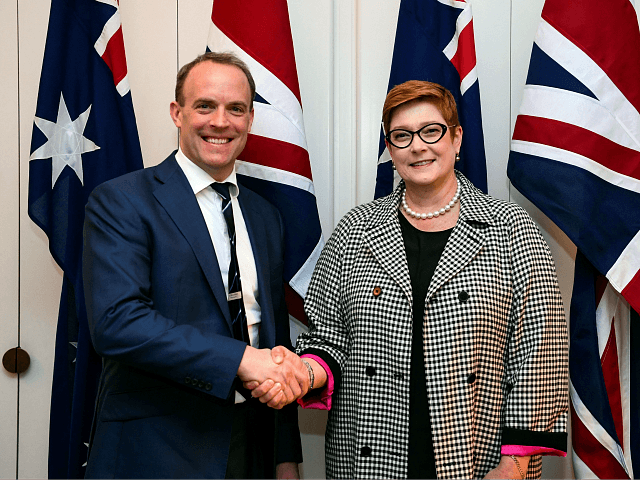Foreign secretary Dominic Raab has headed to Australia to begin a tour of south Pacific nations to open discussion for the UK’s “high-priority” trade deals.
While the prospect of a U.S.-UK free trade agreement has been dominating discussion of post-Brexit negotiations, Boris Johnson’s Conservative government has made clear it seeks to build trading relationships around the world, including nations with whom the UK has historic relationships such as former colonies and the Commonwealth.
On Thursday, Mr Raab kicked off his four-day south Pacific visit in Australia, meeting with his counterpart in the capital of Canberra, Marise Payne. Both foreign ministers agreed to begin discussions on an FTA as soon as possible.
Speaking to press, Mr Raab said: “We’ve recommitted today to launching negotiations on an ambitious free trade agreement between our countries as soon possible.”
“Australia would hopefully be part of that first wave of high-priority deals that we’re pursuing,” he added.
Miss Paine agreed that the two countries, which both have the Queen as Head of State, could come to an agreement, saying: “We are… at opposite ends of the world, yet we are very ready and able to grab a new era of opportunity for enhanced strategic and economic cooperation.”
“We also look forward to an early, comprehensive and ambitious free trade agreement because we both believe in rules-based markets for trade and investment,” she added.
“We voted to be independent." https://t.co/VpvaOYglLD
— Breitbart London (@BreitbartLondon) February 4, 2020
Mr Raab also reaffirmed the security of the Anglosphere security cooperation to which both countries belong — the Five Eyes, comprising of the United Kingdom, United States, Canada, Australia, and New Zealand — will not be endangered by the British use of Chinese firm Huawei in developing its 5G network.
Both Australia and the United States have been the most vocal critics over Britain’s potential engagement of Huawei, with concerns that the company is controlled by the Chinese government and could leave British communications vulnerable to foreign espionage.
Mr Raab said in comments reported by the Associated Press: “We were absolutely clear and looked at it very clearly and there is nothing in the decision that we took that would inhibit or disrupt in any way whatsoever the Five Eyes intelligence sharing and there‘s nothing in the approach that we are taking that would have an impact on, for example, the sharing of sensitive data.”
The British foreign secretary is also set to visit Japan and former British colonies Malaysia and Singapore.
Raab’s successful meeting with the Commonwealth nation will signal to the EU that Britain is open for business and that future commerce is not dependent on trading with the European bloc, whose share of global GDP is dwindling annually.
Boris Johnson sent a strong message on Monday that the UK will be ambitious in its prospects of a trade deal with the EU, but will not accept Brussels’ regulations in exchange for one. Rishi Sunak of the Treasure and senior Cabinet minister Michael Gove have both said that the UK does not need a trade agreement with the EU, the government articulating that it is prepared to trade with the bloc on World Trade Organization rules if an agreement is not made by the end of the transition period in December 2020.
On Tuesday, the UK made the momentous return to the WTO, taking an independent seat after years of being represented by the European Union. The UK’s ambassador to the WTO Julian Braithwaite sat next to the U.S. representative rather than the Europeans, signalling Britain is looking outwards to forge strong relationships, not inwards into Europe.
Brexit Britain Retakes Independent Seat at World Trade Organization https://t.co/EzHORM9AWZ
— Breitbart London (@BreitbartLondon) February 5, 2020

COMMENTS
Please let us know if you're having issues with commenting.